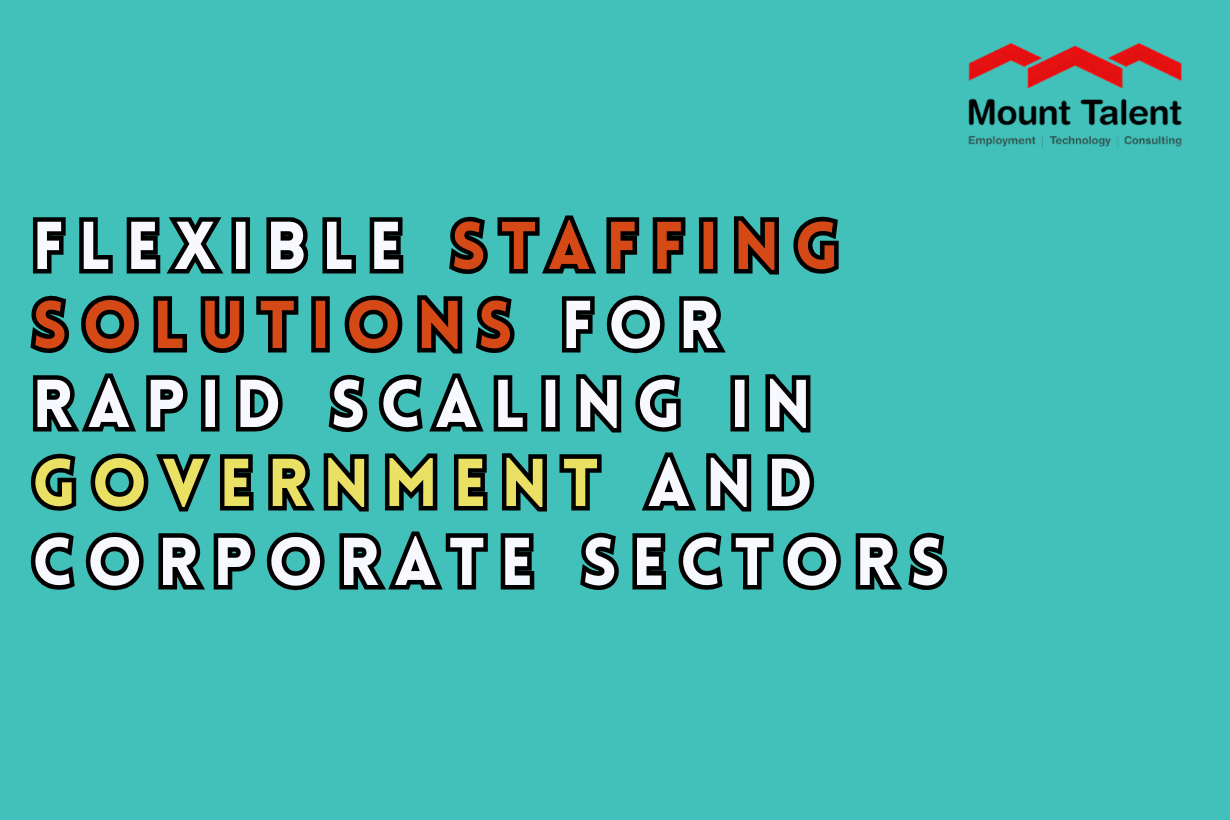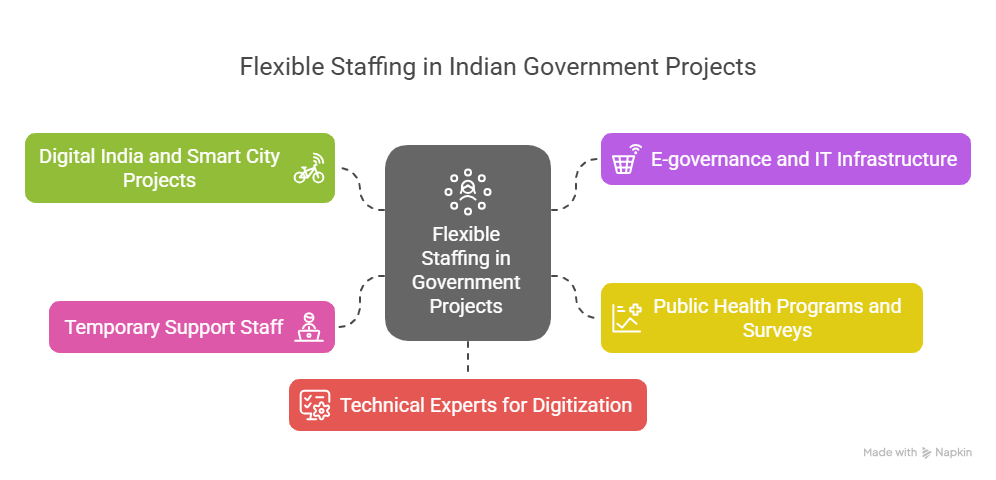
Flexible Staffing Solutions for Rapid Scaling in Government and Corporate Sectors
- by Mayank.Thapa
As India enters a new phase of economic growth and digital transformation in 2025, the way companies and government bodies hire and manage their workforce is evolving. Increasingly, both public and private sector organizations are turning to flexible staffing solutions in 2025 to meet the growing need for agility, cost efficiency, and operational scalability.
Whether it’s handling a sudden surge in demand, managing seasonal workflows, or onboarding specialized talent for short-term projects, flexible staffing has become a cornerstone of modern workforce planning. In this blog, we will explore the importance of staffing solutions in India, especially in the government and corporate sectors, and how businesses can make the most of them.
What Are Flexible Staffing Solutions?
Flexible staffing refers to workforce strategies that allow companies to hire professionals on a temporary, contract, project-based, or part-time basis. These staffing models provide organizations the ability to scale up or down without being constrained by long-term commitments. It includes:
- Contractual staffing
- Project-based hiring
- Temporary placement services
- Outsourced or managed services
- Gig and freelance hiring
Such models are especially useful in sectors that deal with fluctuating demands or time-bound government initiatives. Moreover, in the age of digital and hybrid workspaces, businesses can build agile teams spread across cities or even time zones, optimizing operations in real time.
Why Flexible Staffing is Gaining Momentum in 2025
There are several reasons why flexible staffing solutions in 2025 are becoming more mainstream:
- Faster Time-to-Hire – In an era where business demands shift rapidly, the ability to quickly onboard skilled professionals gives organizations a competitive edge. Flexible staffing agencies offer pre-vetted talent pools, reducing hiring time significantly. This agility is critical during product launches, campaign rollouts, or new branch openings.
- Cost Efficiency – Permanent hires come with long-term financial commitments, including benefits, training, and severance costs. Flexible staffing helps control labor costs without compromising productivity. This is especially beneficial for startups and MSMEs managing tight budgets or those looking to scale without long-term liabilities.
- Access to Specialized Skills – Many government tenders and corporate projects require niche skills that aren’t available in-house. Flexible hiring allows organizations to bring in experts just for the duration of the project. This model fosters knowledge sharing and innovation without the cost of full-time employment.
- Scalability – Organizations involved in national rollouts or temporary campaigns (like a government census or digital survey) need to scale up manpower quickly. Flexible staffing makes it possible. Additionally, businesses in fast-growth sectors like fintech, e-commerce, and health tech can tap into this model to expand without delay.
- Compliance and Risk Mitigation – Top staffing agencies ensure full compliance with labor laws, minimizing legal risks for their clients. This is especially important in government contracts. Agencies handle background checks, labor law adherence, PF/ESI payments, and audit reports—freeing up valuable HR bandwidth.
Application of Flexible Staffing in Government Projects

Government departments increasingly rely on staffing solutions in India to meet urgent or large-scale workforce needs without bloating permanent staff rolls. Examples include:
- Digital India and Smart City projects
- E-governance and IT infrastructure initiatives
- Public health programs and surveys
- Temporary support staff for elections or census operations
- Technical experts for departmental digitization
Such deployments are cost-effective, faster to execute, and flexible enough to wind down once the project concludes. Moreover, agencies handling such contracts bring logistical and technical expertise that traditional bureaucratic setups may lack.
Corporate Sector and Rapid Growth Demands
Corporates, especially in industries like e-commerce, BFSI, telecom, and healthcare, are also leveraging staffing solutions in India to scale quickly and meet competitive challenges. For example:
- Startups use contract-based employees to stay lean and agile.
- Retailers hire seasonal staff for festivals and year-end sales.
- IT companies bring in freelance or project-based developers.
- MNCs use third-party staffing partners to manage compliance and payroll.
- Manufacturing firms employ temporary labor to meet production peaks.
Flexible staffing also supports innovation labs and pilot teams that test new products or markets without long-term risk.
The Role of Staffing Agencies
Professional staffing partners like Mount Talent Consultancy are bridging the gap between skilled professionals and organizations looking for rapid, compliant workforce solutions. Their services include:
- End-to-end recruitment and onboarding
- Skill testing and background verification
- Payroll and compliance management
- Project-based team deployment
- On-site workforce supervision
- Customized staffing for government tenders and private RFPs
With dedicated client servicing teams and pan-India presence, such agencies ensure a seamless hiring experience from planning to execution.
Trends Shaping the Future of Staffing in India
- Tech-Enabled Staffing Platforms – AI-driven tools are helping match candidates with roles faster and more accurately. Predictive analytics is also enabling better demand forecasting and workforce planning.
- Rise of the Gig Economy – More professionals prefer flexible or freelance work, especially in metro and Tier-1 cities. This shift is giving companies access to a diverse talent pool not bound by geography.
- Hybrid Work Models – Companies are blending remote, contract, and full-time staff for better productivity. Hybrid staffing solutions are helping reduce overheads while boosting employee satisfaction.
- Focus on Diversity & Inclusion – Flexible hiring is helping reach diverse talent pools, including women returning to work, veterans, and people with disabilities. Programs are being designed to reskill and reintegrate marginalized communities.
- Outcome-Based Hiring – Rather than hiring for a role, companies are hiring teams to deliver specific project outcomes. This aligns compensation with delivery and improves accountability.
- Government Policy Support – With skilling and apprenticeship schemes like PMKVY and NAPS, government bodies are encouraging contractual staffing models, especially for rural and youth employment.
Conclusion
Flexible staffing isn’t just a trend, it’s a necessary evolution in how businesses and governments approach workforce management. With the right strategy and partners, organizations can unlock agility, reduce costs, and build scalable teams ready for any challenge.
In 2025, the winners in both the public and private sectors will be those who adapt to this model quickly and efficiently. Mount Talent Consultancy stands ready to support that transformation with deep expertise, sectoral knowledge, and a wide network of pre-qualified professionals across India.
If you’re planning to scale, diversify, or run a short-term project, flexible staffing is the smartest way forward.
As India enters a new phase of economic growth and digital transformation in 2025, the way companies and government bodies…
